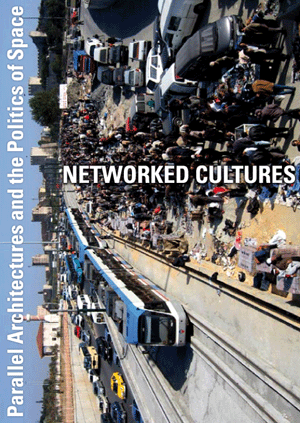_login
registrieren
_5 Factories - Worker Control in Venezuela Dario Azzellini & Oliver Ressler
_ALMOSTREAL ECF
_AnArchitektur Jesko Fezer
_Arizona Road Azra Aksamija
_Balkan Konsulat rotor
_Bata-ville: We are not afraid of the future Nina Pope + Karen Guthrie / www.somewhere.org.uk
_Black Benz Race krcf in collaboration with Felix Stalder, Arben Gecaj, Faton Topalli and Osman Osmani
_Black Sea Files Ursula Biemann
_Camp La Jolla Military ParkOwen Mundy
_CHANGE REALITY: Renaming the Streets of Zagreb REINIGUNGSGESELLSCHAFT
_Conceptual Paradise. There is a place for sophistication Stefan Roemer
_de-regulation Irit Rogoff, Kutlug Ataman, Stefan Roemer

____________Bloomberg SPACE, London
____________Kumu Art Museum Tallinn
____________Open Space, Open Systems - Vienna
____________CAA 2011 Conference, New York
____________Forum Stadtpark, Graz
____________Symposium, Istanbul
____________lungomare, Bozen/Bolzano
____________Metropolis Biennale 2007-17, Copenhagen
____________new publication available now
____________Mestna Galerija, Ljubljana
____________Livestream of Networked Cultures documentary
____________
|
13-16 June 2006
‘Hierarchy and Power in the History of Civilizations’
Fourth International Conference
Russian Academy of Sciences
Moscow
Panel VIII: Networked Cultures – Negotiating Cultural Difference in Contested Spaces
Speakers: David Dibosa, Roxanne Easley, Cordula Gdaniec, Petra Gemeinböck, Andreas Kofler, Helge Mooshammer, Peter Mörtenböck, Lee Rodney
Panel convenor: Peter Mörtenböck (Goldsmiths, London)
This panel aims to discuss the dynamics and potentials of newly emerging socio-political networkstructures and the ways in which they re-conceptualise socio-political organisation through innovative forms of spatial practice. It looks at contemporary spatial practices characterised by a dislocation and dispersion of contributors, participants and spectators, by processes of fragmentation and multiplication, by a shifting of perspectives from dominant centralities to networked peripheries, clandestine economies and virtual sites. In doing so, this panel intends to question the ways in which the local is reinstalled as a new sphere of activities which can only be understood through its network of relationships with other localities.
Albeit an increasingly fictitious construct, urban space continues to be a central site of negotiation between conflicting cultural histories, narratives and values in Europe and between Europe and other world regions. Call centres, for instance, create the illusion of speaking to someone geographically close to the location of the client, they create a sense of ‘hereness’, whereas for economic reasons more and more call centres of the Western world are relocated to Asia. Territorial boundaries are both being undermined and upheld as is the case in the recently proposed building of Austrian prisons in Rumania or the British border controls on French territory. Both the contested geography and the contested imaginary described in these and in many other instances are indicative of a rapidly growing fragmentation and attempted re-stabilisation of space formed in and by the projection of dominant cultural narratives. These power moves challenge our traditional understanding of cities as sites of actual exchange: The exchange between communities is not bound to a material site any longer, it rather develops into a site of migratory co-existence and cross-cultural networking. What is at stake in these newly emerging communities of fleeting identifications and chance encounters is a new way of thinking through the problematics of an illusory ‘hereness’ in relation to an illusory ‘thereness’.
A crucial question addressed here is the extent to which we actually participate in these complexities of socio-political organisation and how we relate to concepts and images produced by culturally specific groups to which we belong or to which we do not belong. As participation can no longer be restricted to instruments such as memberships, polls and questionnaires, we have to look at new modes in which collectivities (contact zones, nodes of intensities and communities) are developed. How do new forms of communication and representation, in particular virtual-spatial ones, change the social spaces where different cultures meet? How do public fantasies interact with the actual living conditions of citizens? How do constructions of an illusory ‘hereness’ relate to constructions of a similarly illusory ‘thereness? Contributions to this panel consider different spaces of contested nature: spaces which exhibit or call for the potentiality of new forms of cohabitation and cross-cultural fertilisation. The panel investigates how such networked cultures reflect and generate new epistemological models and intends to critically assess their potential for cultural dialogue.
|
+ Ana Dzokic and Marc Neelen
+ Ayreen Anastas and Rene Gabri
+ atelier d'architecture autogérée (aaa)
+ Asya Filippova
+ Sophie Hope and Sarah Carrington
+ Branca Curcic
+ Christoph Schaefer
+ Campement Urbain
+ Claudia Zanfi
+ Despoina Sevasti and Poka-Yio
+ Erden Kosova
+ Helmut Batista
Radio as Spatial Practiceby: Paulo Tavares
Survival Kits: Artistic Responses to Globalizationby: Marga van Mechelen
What Ever Happened to Cultural Democracy?by: Sophie Hope
I don't know how to explain ...by: Anca Gyemant
Trading Placesby: Peter Moertenboeck & Helge Mooshammer
Milosevic as Architectby: Srdjan Jovanovic Weiss
When the Unavoidable Knocks at the Door ...by: Gulsen Bal
Tracing Translocality: The BlackBenz Raceby: Felix Stalder
travelling lexicon towards a global positioning systemby: Celine Condorelli
|
